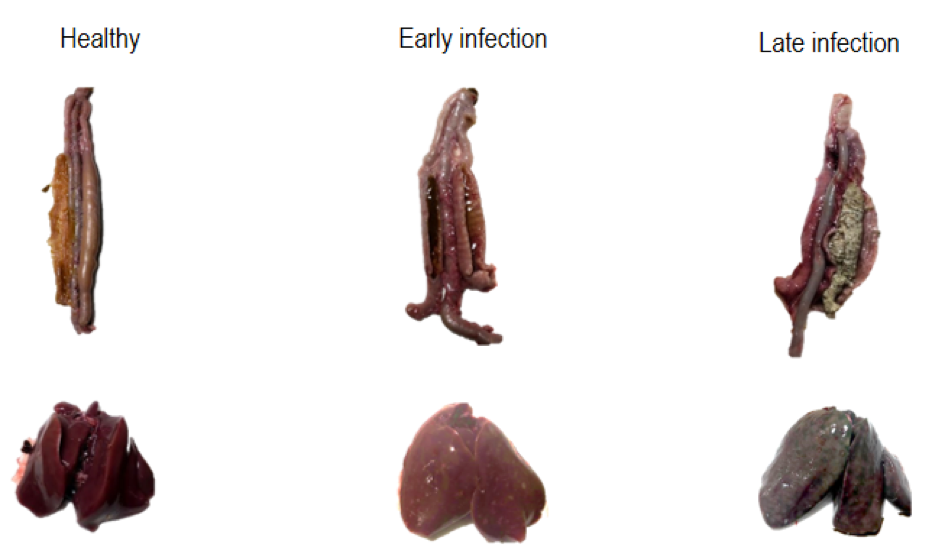Read time: 3 minutes
histomonas
Histomonas, or blackhead disease, is caused by Histomonas meleagridis, a protozoan flagellate. Transmission can be by a vector, the caecal worm Heterakis gallinarum (poultry and turkeys), or direct by cloacal drinking (turkeys). The disease affects mainly turkeys, as other poultry species seem to be less susceptible. Nevertheless, the disease is often diagnosed in laying and breeder hens, and more prevalent in free range systems where the hens are more likely to be exposed to worms (vector).
Clinical signs of the disease are: caecal ulcerations, ‘bulls-eye’ lesions in the liver, Sulphur-colored diarrhea, reduced weight gain, and high mortality rates. Mortality rates up to 40% in turkeys and 10% in hens are no exception; the financial impact for the turkey farm can be as high as 75% less profit per turkey raised. The disease is sometimes mistaken for colibacillosis but confirmed diagnosis can be made based on the symptoms and isolation from cloacal swabs by PCR or ELISA, necropsy of the deceased birds can confirm the diagnosis, as the typical caecal and liver lesions are pathognomonic for the disease.
How blackhead disease progresses:
 Fig. 1 Progression of blackhead disease
Fig. 1 Progression of blackhead disease
How can you control histomonas?
In the past, active substances (such as ronidazole) were available for prophylactic or treatment use to control the disease but were banned due to food safety reasons. Up until now, there are no commercial vaccines available.
Prevention of this disease should be your primary strategy where hygiene and biosecurity play a vital role. Focus must be on measures to prevent transmission of the disease.
The type of measures you must take, depends on the housing system. In free range poultry, focus will be on the prevention of worm infections (Heterakis) whereas in turkeys focus will be on biosecurity avoiding entrance of the pathogen in the house and other measures to avoid cloacal drinking such as compartmentalization.
Additionally, in feed supplementation has shown promising effects. We have seen that products containing encapsulated organic acids and essential oils are beneficial. The encapsulation of the supplementation is mandatory for an efficacy in the gut. However, more research has to be performed to confirm the potential controlling effect of those substances.
We would like to share with you a peer reviewed article published at the International symposium on Parasite infections in Poultry in Austria. The article focuses on how encapsulated organic acids are effective at controlling Histomonas growth in vitro.

